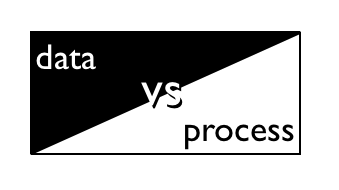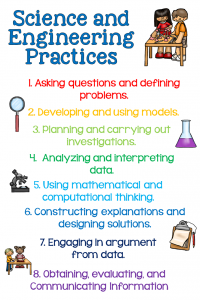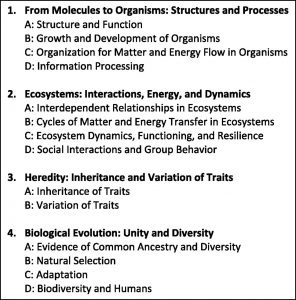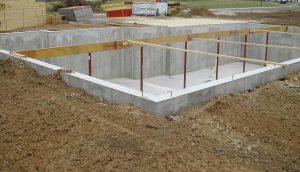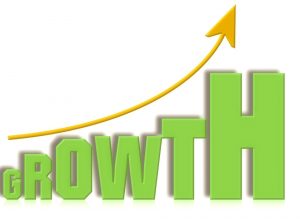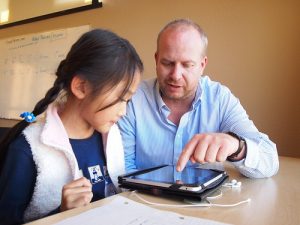As I mentioned in an earlier post, I am looking into the idea of having students and teachers discuss and decide on a suitable grade at the end of a grading period by using one-on-one conferences. During the conference, the teacher asks the student to reflect upon their own learning by evaluating their growth. I have been inspired by a group of educators that has formed a group DM on twitter and a Facebook group. We have called our group #TG2 (Teachers Going Gradeless). Many of the experienced members of the group are English Language Arts teachers, whose curriculum is based mostly on skills and processes (see Common Core ELA Standards). Practicing skills allows the class to continually go back over the same principles again and again and show growth.
But what if the course is more content driven than process driven?
My cooperating teacher, Tom DiGaetano (Mr. D to the kids), during my student teaching always used to say “Just as a house is made of stones, so too is science made of facts, but a pile of stones is not a house, and a pile of facts is not a science”. I agree the content (aka, data or facts) is essential to learning science, but the doing of science is not fact gathering. So how can we practice content? How do we show growth in content? How can we ask students to discuss their improvement in collecting a pile of stones or acquiring facts? I have come to the simple realization … We can’t. But what we can do is demonstrate growth by demonstrating the doing of science. So I am looking towards the Next Generation Science Standards (and NY State Science Learning Standards) for answers with a little guidance from my #TG2 friends.
NGSS for High School Life Science:
8 Science and Engineering Practices(SEPs)
14 Discipline Core Ideas (DCIs) in the Life Science
7 Cross-Cutting Concepts (CCCs):

With all of these standards – Where do I start?
- 8 SEPs, 14 DCIs and 7 CCCs …
- Do I start with the content? The practices? Cross-cutting concepts?
- I didn’t even mention the performance expectations, mostly because there are 24 of them. Having too many standards means too many things to try and remember. Having too many standards means it is difficult to show growth.
So, here is my dilemma, how do I show growth through content when most of the content is explored in a one-time deal in class and rarely recursive. For example, LS3A Inheritance of Traits might only be covered in a traditional Genetics Unit. True, it might be covered again in Evolution, but certainly not to the same depth as in Genetics and even if it was, is two enough to show growth? In my opinion giving the students only two chances to show mastery is not much of a chance to show growth. It is not sufficient to use it as the foundation of one’s assessment practice. The scenario was going around and around in my head …
I couldn’t get past it. I couldn’t get past it because I was stuck in the paradigm of asking for a pile of stones while expecting a mansion.
Like Mr. D would say, Science is not a pile of content, but the content is foundational to the doing of science. However, the science practices ARE the doing of science. Once I was able to get out of confines of my mental block I could see alternatives. The alternative … instead of measuring growth in the DCIs, I could measure growth in the SEPs.
Measure growth through improving student science practices rather than their memorization of disconnected content.
Use the Science and Engineering Practices to measure growth. I do believe that content provides the foundation for success in science much like a solid foundation is critical to building a house. But more questions remained … Do you need to build a house on a perfect foundation, or can you build a house on a foundation that is adequate for the house being built? I wondered the same thing about being able to do science. Do students require perfect knowledge base or will an adequate base suffice to start doing science? (More on how to achieve an adequate knowledge base in part 2).
Is one foundation better than the other or will they both adequately do the job? Should we spend all our time on the perfect foundation when we really are interested in the house that is built on top of it?
These questions made me think about what type of students end up making the best scientists. Are they the students who can memorize all the facts? Well, sometimes, but is that most important in order to practice the doing of science? One must get into the science practices by practicing science. If a student spends all their time memorizing facts to get closer to the perfect foundation, what time is left to actually DO science? Students will learn science by doing science. If the students are doing science practices over and over then couldn’t growth be measured?
The Crosscutting concepts are a huge part of the NGSS and I do not want to leave that out either. When it comes to the number of standards needed to demonstrate growth – less is more. If there are fewer standards to demonstrate growth, then those standards will be addressed more often. If they are addressed more often then there is a greater opportunity to show growth. With that in mind here is a (very rough) draft of my standards to measure growth in science:
- Connecting cross-cutting concepts in biology (A combination of all the CCCs)
- Asking questions, planning and carrying out investigations (A combination of SEP1 and 3)
- Analyzing and interpreting data in order construct explanations (A combination of SEP4 and 6)
- Obtaining, evaluating and communicating information in order to engage in argumentation. (Combination of SEP7 and 8)
- Developing and using models (including using mathematics and computational thinking) (A combination of SEP2 and 5)
But what about the Foundation? How do we know what is adequate? More on that in part 2 …
In the meantime, please let me know what you think. Can growth in a science class be assessed with these five standards? Do they address the NGSS standards?
